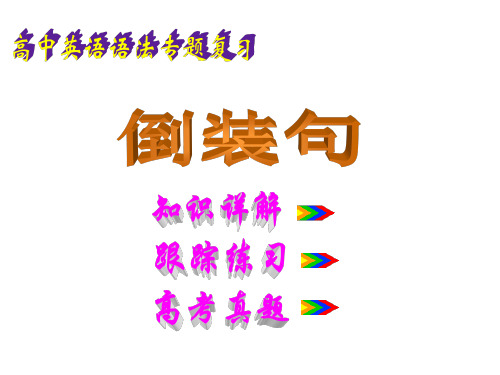高三英语复习课件:英语倒装句讲解1
《高中英语倒装》PPT课件

Example
The book is very interesting (Indicating that this book is very interesting)
She looks happy today (Indicating that she looks very happy today)
Comparison between Object Prepositioning and
Object preposition is commonly used in oral and informal writing to increase the vividness and expressiveness of language; Postposition is more common in written and formal language to maintain sentence balance and coherence.
Inverted sentence definition
Inverted sentence is a grammatical structure in which the position of the predicate verb or auxiliary verb is opposite to the normal word order and placed before the subject.
Subjunctive mood
In some sentences with subjunctive mood, the subject verb inversion structure is also used.
Object preposition and
高考英语语法一轮复习——倒装(共22张PPT)

Such great progress did he make that he was praised.
1. So nervous ____D____ that she made several
助动词/情态动词 /系动词 +主语 + 实意动词+其它
Away flew the birds. 完全倒装
Not until the teacher came did he finish his
homework.
部分倒装
完全倒装
1、当there 、here、now、then 、 in 、out 、 up 、 down 、 away, off, etc等副词位于句首时,谓语动词 是come, go, fly 等表示位置移动的动词, 常用全部
Between the two buildings stands a tall tree. Under the table lay a dog
In front of the gate stand two stone lions.
4. 当主语太长, 且句子结构是“主+系+表”时,
可以用完全倒装,即: 表+系+主
C. do I speak
D. I speak
2、表示否定意义的词位于句首时,如:not, never,
seldom, hardly, barely, scarcely, little, not until, by no means, in no time, not only…but,no sooner than, in no case, nowhere, neither, nor, rarely放在句首时 用部分倒装
高考英语语法完全讲解——倒装结构课件(共17张PPT)

3、as和though引导的让步状语从句,采用倒装形式。 Tired as/though he was, he still went on with his work. Try as/though you might, you can’t keep the lost time. Much as/though he likes the bike, he doesn’t want to buy it.
2、whatever+n.引导让步状语从句,意为“无论什么……”, however+adj./adv.引导让步状语从句,意为“无论多么……”。
Whatever nonsense the newspapers print, some people always believe it.
However difficult the problem may be, we must work it out this evening.
形式上的倒装
形式上的倒装在语法上称为前置,特点是把强调的内容提至句首, 主谓不倒装,常见的句型主要有以下几种: 1、“the+比较级,the+比较级”意为“越……,越……”。 The more exercise you take, the healthier you are. The harder you work, the greater progress you will make.
Not until he returned did we have supper.
6、表示前面所说的情况也适合于后者时,用“so/neither/ nor+助动词/情态动词/be动词+主语”这样的倒装句式。so用于 肯定句中, neither/nor用于否定句。 He can sing English songs, and so can I. He didn't see the film, and neither did I. She likes music, and so do I. She hasn't read it, and nor have I.
《英语倒装句讲解》课件

2 特殊疑问句的倒装
一般疑问句和特殊疑问句中的倒装形式有所不同,需要根据具体情况进行调整。
3 并列谓语句的倒装
在并列谓语句中,可以使用倒装句来强调其中的某一部分,增强表达的效果和力度。
总结
倒装句的使用既有优点,又存在一定的局限性。通过掌握不同类型倒装句的构造和使用方法,能够提升英语表 达的多样性和灵活性。
Never ______________ this experience.
Often ______________ his mother with household chores.
练习题示例:
She rarely goes to the cinema.
They will never forget this experience.
He often helps his mother with household chores.
Rarely ______________ to the cinema.
如何构造谓语部分倒 装
将状语或介词短语置于主语之 前,并将谓语动词保持原来的 形式。
谓语部分倒装的用法
谓语部分倒装常用于强调或修 辞需要,尤其在文学作品和演 讲中,更能引起听者的注意。
倒装句的注意事项
在使用倒装句时需要注意句子语态的转换、特殊疑问句的倒装形式以及并列谓语句的倒装方法。
1 句子语态的转换
《英语倒装句讲解》PPT 课件
# 英语倒装句讲解
简介
什么是英语倒装句?倒装句是一种特殊的语法结构,在句子中,主语与谓语的次序颠倒,能够提升句子的语法 层次,并增加句子的表达力。
完全倒装句
高考英语倒装1(PPT)5-3

但: In the armchair she sat. Look! Here they come.
5.当句首为表示地点的介词短语时,如果句子的主 语为名词,那么句子的主语和谓语完全倒装。
Outside the classroom stood an old man.
On the wall hangs a large map of China.
East of the town lies a beautiful lake.
1. 在英语中,主语和谓语的语序通常是主语 在前,谓语在后。但有时由于语法结构的需 要,或者为了强调,谓语的全部或一部分要 提到主语的前面,这种语序叫做倒装。
2. 倒装的种类:
全部倒装是把全部谓语放在主语之前.
部分倒装是把助动词.情态动词或be动词放 在主以突出另外的人或事物:这么难的题~小学生不会做,就是中学生也不一定会做。也说别说是。 【别提】动表示程度之 深不必细说:他那个高兴劲儿啊,就~了。 【别无长物】没有多余的东西。形容穷困或俭朴(长,旧读)。 【别无二致】没有两样;没有区别:这两个人的 思想~。 【别绪】名离别时的情绪:离愁~。 【别样】形属; https:///fengkuangwei/ 冯矿伟;性词。另外的;其他的;不同一般的:~ 风情。 【别有洞天】另有一种境界。形容景物等引人入胜。 【别有风味】另有一种趣味或特色:围着篝火吃烤肉,~。 【别有天地】另有一种境界。形容 风景等引人入胜。 【别有用心】ī言论或行动中另有不可告人的企图。 【别针】(~儿)名①一种弯曲而有弹性的针,尖端可以打开,也可以扣住,用来把 布片、纸片等固定在一起或固定在衣物上。②别在胸前或领口的装饰品,多用金银、玉石等制成。 【别致】形新奇,跟寻常不同:这座楼房式样很~。 【别 传】名记载某人逸事的传记。 【别子】名古代指天子、诸侯的嫡长子以外的儿子。 【别子】?名①线装书的套子上或字画手卷上用来别住开口的东西,多用 骨头制成。②烟袋荷包的坠饰。 【别字】名①写错或读错的字,比如把“包子”写成“饱子”,是写别字;把“破绽”的“绽”()读成“定”,是读别字。 也说白字。②别号。 【蹩】〈方〉动脚腕子或手腕子扭伤:走路不小心,~痛了脚。 【蹩脚】〈方〉形质量不好;本领不强:~货。 【瘪】(癟)形物体 表面凹下去;不饱满:干~|~谷|没牙~嘴儿|车带~了|乒乓球~了。 【别】(彆)〈方〉动改变别人坚持的意见或习性(多用于“别不过”):我想 不依他,可是又~不过他。 【别扭】?形①不顺心;难对付:这个天气真~,一会儿冷,一会儿热|他的脾气挺~,说话要注意。②意见不相投:闹~|两 个人有些别别扭扭的,说不到一块儿。③(说话、作文)不通顺;不流畅:这个句子有点儿~,得改一改。 【别嘴】〈方〉形绕嘴:这段文字半文不白,读 起来~。 【邠】ī①邠县,地名,在陕西。今作彬县。②同“豳”。③名姓。 【玢】ī〈书〉玉名。 【宾】(賓、賔)ī①客人(跟“主”相对):外~|~至 如归。②(ī)名姓。 【宾白】ī名戏曲中的说白。中国戏曲艺术以唱为主,所以把说白叫做宾白。 【宾词】ī名一个命题的三部分之一,表示思考对象的属性 等,如在“金属是导体”这个命题中,“导体”是宾词。 【宾东】ī名古代主人的座位在东,客人的座位在西,因此称宾与主为宾东(多用于幕僚和官
高考英语倒装句记忆口诀加例句 课件 共12张PPT

1. 完全倒装
③• .表地点/方位的词/介词短语:in / on / out / up /down)+ V + 主语(名词) • Up jumped the cat and caught the mouse. • Out rushed the students. • In front of the door stood a man who wore a red hat. • Between the two hills lies a river. • At the foot of the hill stands a high building with some trees around it
• There stands a high building with some trees around it at the foot of the hill. • There are a large number of students in the classroom. • Here comes the bus. • Here it is . Here you go. T句型:It is/was+ 被强调部分+that (who)+其他... • : I met an old friend in the street yesterday. → It was I that met an old friend in the
street yesterday.(主语) • → It was an old friend that I met in the street yesterday. (宾语) • → It was in the street that I met an old friend yesterday. (地点状语) • → It was yesterday that I met an old friend in the street.(时间状语) • It’s because his car broke down that he was late for school.(句子)
2024届高考英语倒装句课件(共26张PPT)
试卷讲评课件
4.表语置于句首时e +主语.
e.g. Happy are those who are contented.知足者常乐.
e.g. Present at the meeting were twenty teachers and thirty students.
倒装句
一、完全倒装 二、部分倒装
一、完全倒装
试卷讲评课件
整个谓语放在主语前 结构:谓语动词+主语 e.g. Away went the boy. 那个男孩走开了. 1.表示方向、时间或方位,地点的副词或介词短语,置于句首,用完全倒装. 如: here, there, now, then , up. down.in. out. away. in the room . on the wall 等。(注:主语必须是名词;若主语是代词不能倒装.)
e.g. On the table were some flowers. Then followed three days of heavy rain. Out rushed the children laughing loudly.
试卷讲评课件
2.Such置于句首时,用完全倒装。(注:such / so …that…中, such /so部 分位于句首时,句子用部分倒装.) E.g. Such are the facts: no one can deny them. 这些就是事实,没有人能否定它们. e.g. So much homework did we have to do that we had no time to have a rest.
高中英语语法复习:倒装句课件(共48张PPT)
•I realized that I should have taken your advice only when I lost the game. •Only when I lost the game did I realize that I should have taken your advice.
to his wife. • Nor could his wife.
A strong negative feeling.
• 表示强调。 • 承上启下。 • 平衡结构。 • 增强句子的表现力。 • 制造悬念,渲染气氛。
基本语序
主语 + 谓语
He knew no one in Paris.
倒装语序
An old jacket hangs on the wall. Two lakes lie to the east of the city.
3. 以引导词there开头的句子,须使用倒 装结构,除 there be 外还有there live / stand
THhaorudgahshheewwoorrkkeeddh, ahredf,ahileedfa.iled.
Trhyouagshhehemmigihgth,tTtorym, Tcomuldconuoltdgneot tout goef thoeudtiofffictuhletyd.ifficulty.
Exercises: •I did not begin to do my homework until my mother came back.
Not until (my mother came back) did I begin to do my homework.
高三英语语法倒装句完整课件 (1).ppt.Convertor
倒装句句子基本语序主语+谓语+宾语一、完全倒装谓语+主语二、部分倒装系动词/情态动词/助动词+ 主语+ 动词一、完全倒装1.表地点、时间、方位的副词置于句首:(there, here , then, now, in, out, up, down, away, off,)There goes the bell.Here comes the bus.Then came the time to sleep.Now comes your turn.Out ran the boy.In comes Mr. Smith.结构:副词+ 谓语动词+ 主语注意:(1)主语为人称代词时,不倒装(仅限完全倒装)公车来了:Here___________他来了:Here_________2.表示地点的介词短语位于于句首:(谓语通常是be , stand, sit , lie 等动词)At the foot of the hill lies a beautiful lake.Inside the box is a monster.介词短语+ 谓语+ 主语要注意谓语应与其后的主语保持一致,Under the tree_______ a boy. (stand)Under the tree_______ two boys.3. 作表语的形容词, 过去分词,现在分词置于句首:Present at the meeting was Professor White.Gone are the days when we were children.Standing beside the table was an writer.表语+ 系动词+ 主语*强调:Such, The following放句首时,句子要完全倒装。
1)Such is life.2)The following is the answer to the question.练习:1) There ________. And here ________.A. goes the phone; she comesB. is the phone going; is sheC. does the phone go; does she comeD. the phone goes; come she2) Out ________, with a stick in his hand.A. did he rushB. rushed heC. he rushedD. he did rush3) ________ from the top of the building when the policeman pointed the gun at him.A. Jumped down the robberB. Jumped the robber downC. Down jumped the robberD. Down the robber jumped4) ________, a man of achievements, deep thoughts, but with simple habits.A. Einstein was suchB. Such was EinsteinC. Einstein was soD. So was Einstein二、部分倒装部分倒装是把be动词、情态动词、助动词放到主语之前。
高中英语倒装句专题讲解(共37张PPT)
Now come后th。e m但e有n’时s 1谓10语hu的rd全le部s. 或者 Out rush t一he部at分hl(ete通s.常是助动词或情 Up they j态um动p词. )却提到主语的前面, So fast does这Jo种h语n r序un叫th做a“t h倒e b装re”ak。s the school record. Never shall we forget the exciting moment.
1). 否定代词或副词 (never, neither, nor, little, few, no/not, seldom, rarely, hardly, barely, scarcely, nowhere等) 位于句首时
a. We have never seen such a sight before. Never before have we seen such a sight.
某人也不是如此
e.g. Jack can not answer the question. Neither /
Nor can I. 注意:So +主语+be/助动词/情态动词
某人确实如此
e.g. Betty is a nice girl. So she is .
5. So/Such …that…引导状语从句,当so、such
b. He seldom goes to school late. Seldom does he go to school late.
我很少去看电影. • I seldom go to the cinema.
• Seldom do I go I will never forget the day when I joined the Youth League.
- 1、下载文档前请自行甄别文档内容的完整性,平台不提供额外的编辑、内容补充、找答案等附加服务。
- 2、"仅部分预览"的文档,不可在线预览部分如存在完整性等问题,可反馈申请退款(可完整预览的文档不适用该条件!)。
- 3、如文档侵犯您的权益,请联系客服反馈,我们会尽快为您处理(人工客服工作时间:9:00-18:30)。
Grammar Inversion --倒装句1.倒装句的定义英语最基本的词序是主语在谓语动词的前面。
如果把谓语动词放在主语前面,就叫做倒装.Inversion is the changing of the order of the words in the sentence.2.倒装句的构成a)完全倒装b) 部分倒装In came the headmaster, followed by a group of teachers.•将句子的主语和谓语完全颠倒过来,称之为完全倒装。
Seldom have we felt as comfortable as here. •只将助动词、系动词或情态动词移至主语之前,谓语的其他部分仍保留在主语的后面,称之为部分倒装。
1)句首状语引起完全倒装•(1)“here (there ,now ,then, thus, first, next )+不及物动词+主语”•(2)以out ,in ,up ,down ,away, back, off, inside, outside,Thus ,high,low 等副词开头的句子里,以表示强调。
①车来了。
Here _________________②铃响了。
There_________________③该你的了。
Now__________________④孩子们出去了。
Out __________________comes the bus.goes the es your turn.went the children.They went out.Here he comes.注意:当代词做主语时,主谓语序不变, 不倒装。
⑤他们出去了.⑥他来了。
•Higher and higher_____ and then the kite was out of sight.•A. flew it•B. did it fly•C. it flew•D. was it flying(3)当句首状语为表示地点的介词词组时,也常常引起全部倒装①城南有个大型钢铁厂。
South of the city lies a big steel factory.②这些东西里有圣诞树、花儿、蜡烛和玩具Among the goods is Christmas trees, flowers, candles and toys. 。
(4)表+主+….Gone are the days when the Chinese people were only slaves.Seated on the ground are a group of young people. Standing beside the table was an translator.Present at the meeting were many guests.*当句首状语为不表示地点的介词词组时,引起部分倒装On the back wall hung a picture of my family. Under a tree sat a pretty girl.Beside me sat two students.In this way can we explain the matter.(5)完全倒装用于句型“There+live/lie/stand/exist/remain/be/seem to be/happen to be/used to be/oughtbe/must be /can’t be) +主语”There stands a tall tree in front of the classroom.2)部分倒装(1)用于so/as,nor,neither开头的句子,表示重复前句部分内容,原句的谓语应与前句谓语的时态、形式相一致①他去过北京,我也去过。
He has been to Beijing. So/As have I.②李威回答不了这个问题,我也不能。
Li Wei can't answer the question. Neither can I.如果谓语动词既有肯定又有否定,或谓语动词有多种形式,用so it is with 结构.-------I caught the first bus, I am not late for work.-------So it is with him.注:有时为表示对上文情况的肯定和确认,用正常语序表“确实如此”-------He can speak good English.-------So he can.•---He works hard.•----_________and_________.•A. So he does…..so does his brother.•B. So does he …..so his brother does.•C. So he does… so his brother does.•D. So does he …. so does his brother.(2)用于否定词或短语开头的句型中用于never, hardly, seldom, scarcely, barely, little, often, no , neither , nor, few,at no time, nowhere ,in vai徒劳not once等词放在句首的句子。
〈1〉我再也不会这么做了。
NeverNever shall I do this again.〈2〉他不太知道那个女的是谁。
LittleLittle did he know who the woman was.2)含有否定意义的一些副词,如hardly, scarcely,seldom,little,rarely,never,not/ no/neither/nor/few/nowhere/in vain (徒劳)等位于句首时,引起部分倒装。
还有一些表示否定意义的介词短语位于句首时,句子也要求用倒装结构,常见的这类介词短语都还有“no”, 如,at no time, in no case, by no means, in no way, under/ in no circumstance 等。
in no way/case =on no occasion=by no means=on no account=in / under no circumstances(决不)如,a) Under no circumstances shall I change my attitude towards beauty.无论如何我都不会改变自己对美的态度。
b) At no time and in no circumstances should the fire doors of the building ever be locked.无论什么时候,什么情况下,建筑物的消防通道们都不能锁上。
c) Not a single mistake did I make.d) In vain(无结果的,徒然)did I try to change his mind.f) Seldom does she show her feelings, even when she is said..((3).用于no sooner… than…,hardly… when,scarcely … when;not until, not only …but also ,neither …nor …的句型中。
我刚到她就走了.Hardly had I arrived when she left .No sooner had I arrived than she left.•“一… 就…”, “刚刚….就“句型中,表示一件事情紧接着另一件事情发生。
•Hardly•Scarcely +倒装句(过完)+when +陈述句(过去)•barely•No sooner +倒装句(过完)+than+陈述句(过去)•Hardly /scarcely/ barely had he arrived at the station when the train began to leave.•No sooner had I gone out than he came to see me.3) 含not until的强调句,如果not until位于句首,句子要求用倒装结构,如果是主从复合句,倒装结构出现在主句中。
如,a) Not until all the fish died in the river did the residents realize how serious the water pollution was.b) Not until then did he come to realize how serious the situation was. c) Not until it was dark, did we arrive at the village.直到老师来了,他才写完作业。
Not until the teacher came did he finish his homework.•Not until + 陈述句/时间状语+ 倒装句•Not until the child fell asleep did themother leave the room.•Not until yesterday did I learn it.•(当Not until 引出主从复合句,主句倒装,从句不倒装•Not only +倒装句+but (also )+陈述句•Not only did we lose our money, but also we came close to losing our lives.注:主句部分倒装,从句不倒装;并列连词连接主语成分时,句子不倒装。
Not only could she type but also she could operate the computer.Hardly had he got on the bus when he heard a shout.Neither in school nor at home did he ever wash his clothes.Not only children but also grown-ups are interested in cartoon.(4)用于only开头的句子(only 后面跟副词、介词短语或状语从句)。
